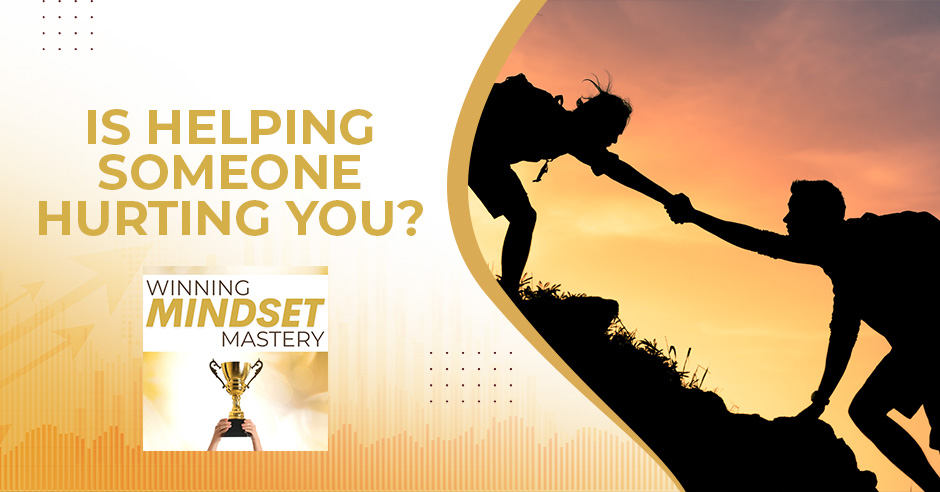
Want to help others without hurting yourself? In this episode, we dive deep into the powerful difference between empathy and sympathy. Discover how to be a supportive friend or leader while maintaining your own well-being. Learn to recognize when your desire to help is actually holding you back and how to shift your perspective to become an inspiring beacon for those in need. It’s time to redefine empathy and unlock your true potential as a compassionate helper.
—
Listen to the episode here
Is Helping Someone Hurting You?
I am so glad you’re here. If you’ve been tuning in to the show for any length of time or you’re familiar with me and my work, you know that in addition to mindset, the thing I love most in the world is helping other people. Having said that, it’s very important for me to share with you that sometimes, trying to help someone else could hurt you, how to look out for those signs, what to do if you find that trying to help someone else is holding you back, and how you can find a way to both help people but also be taking great care of you.
The Balance Between Empathy And Sympathy
I want to talk about empathy and sympathy because, in a lot of areas, people talk about empathy as being superior to sympathy. I want to give you some ideas of how I’m defining these words and the way that I’m talking about them. In this case, I mean empathy as understanding someone else’s feelings and experiences because you are almost feeling those feelings with them. Being empathetic can be very powerful as a person, a friend, a partner, and a leader, but it can also take you too far into what someone else is experiencing. Sympathy, on the other hand, is our ability to observe and accept what someone is going through.
Empathy is understanding someone else's feelings and experience because you are almost feeling those feelings with them. Sympathy, on the other hand, is our ability to observe and accept what someone is going through. Share on X
Both of these are important and great qualities. Empathy has a ton of uses. What I want you to watch out for is something that I struggle with, which is when you are empathizing with someone so much, you find yourself almost going down in your own feelings and your own mindset because you’re so concerned about where they are and you want so badly to help lift them up. Whatever that problem is, you want to help them with it so much that you’re almost getting down to where they are.
Visualizing Success And Leading By Example
I want you to envision this in a different way so maybe you can better understand why you don’t want to go down to where they are. Let’s imagine that instead of this person that you care about being right beside you and telling you about what they’re challenged with, they’re in a ravine and you want to get them out. You want to help pull them up out of the ravine and help them in any way you can.
Would the first thing you’d be doing is to go down there with them or would the first thing you’d be doing is to be thinking about the situation, what tools you have that you could use, and how you can stay up where you are so that you can pull them up? I want you to think about that visual the next time that you’re with someone who is experiencing a lot of challenges and you want to help them.
Remember that you are in a far better place to help them if you stay in your good mindset and stay where you are. You can empathize to understand what they’re going through, but then quickly, I want you to move to sympathy to observe and accept what they’re going through with one caveat. I want you to visualize and see them as successfully getting to a better place, whether they’re successfully getting out of the ravine, successfully getting a new job, or successfully either getting the relationship they’re in to become the one they want or knowing that they should walk away and find one that’s better suited. I want you to visualize them handling this and taking care of it on their own, not necessarily micromanaging or helping to a great extent beyond you believing them and seeing them doing that.
The last thing that you can do that can really help them that we completely underestimate, and I am we because I completely underestimate this and I catch myself doing this all the time, is remember that in addition to seeing them as being successful by you not empathizing so much that you get down into the ravine with them, you can show them the example of what having a powerful mindset and believing that even the tough things are happening for them, not to them can do in this situation by being an example.
Remember. No matter how much we want to tell people how to do things, give them advice, walk them through it, or if you’re like me sometimes who’s like, “Can I live your life for a week? I want to help you out of this situation and then I’ll give you your life back,” which isn’t possible and often doesn’t make people feel any better, them observing your life, the ways that you are able to do things, and how your life runs so smoothly because of all the mindset work you’ve done is incredibly powerful and inspiring. It gives them something to model their own actions after or copy what you are doing to get your results.
I want you to think about that. The next time that you find yourself worrying about someone a lot or worrying about their problem, I want you to make sure that you haven’t found in some way that you’re down in the ravine with them. Stay where you need to be. Imagine them being successful. Be that inspiration that they need to get to the place that they’re going to go. This sounds super simple, but like some of the most amazing, simple things, it has incredible results. It’s also not as easy as it sounds, but it is 100% worth it. I want you to try this the next time you’re experiencing this in your life. Here’s to your success.





